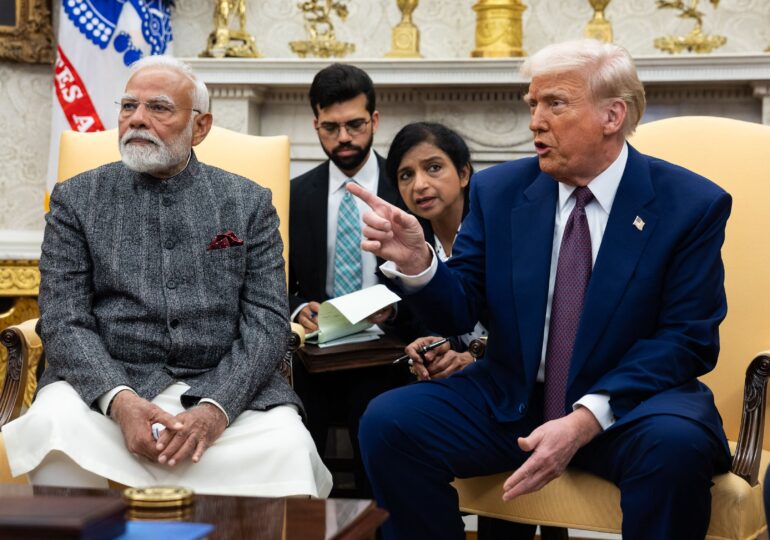The President of the United States, Donald Trump, imposed a 50% tariff on most imports from India on Wednesday, after previously doubling the level of 25% set at the beginning of the month.
The decision is motivated by the purchases of discounted Russian oil, which Washington sees as an indirect way of financing the war in Ukraine.
"I don't care what India does with Russia. They can take their dead economies together, I don't care," Trump wrote on his Truth Social network.
Economic Impact and Indian Exporters' Fury
The measure severely impacts the Indian economy, whose exports to the US were valued at $87.3 billion last year. Some strategic sectors, such as smartphones, remain temporarily exempt, but textiles, jewelry, and seafood, dependent on the American market, are already facing difficulties.
"At a 50% tariff, it's very difficult to export," warned Santanu Sengupta, chief economist at Goldman Sachs India, estimating that the GDP could drop below 6%.
The Federation of Indian Exporters reported production halts in textile factories in Tirupur, Delhi, and Surat, due to loss of competitiveness. "Indian products have become uncompetitive compared to those from China, Vietnam, or the Philippines," emphasized the organization's president, S.C. Ralhan, as quoted by The Guardian.
Modi Bets on "Made in India"
Prime Minister Narendra Modi refused to reduce imports of Russian oil and urged citizens to buy only local products. "Everyone should follow the 'Made in India' goods mantra. The pressure on us may increase, but we will bear it," Modi stated.
Foreign Minister Subrahmanyam Jaishankar described Washington's demand to halt Russian oil purchases as "unjustified and unreasonable," accusing the West of hypocrisy: "Europe engages in much broader trade with Russia."
Relationship with the US, "Hit Hard"
A senior Indian official, speaking on condition of anonymity, stated that "Trump has messed it up (India's relationship with the US + ed.). The hard work between the two countries, which already lacked trust in each other but had managed to build a strong strategic relationship, is now in jeopardy."
Analysts warn that this decision risks pushing New Delhi closer to Moscow and Beijing. India views Russia as a "friend for all seasons," and Modi is set to host Vladimir Putin in New Delhi, following Foreign Minister Jaishankar's visit to Moscow.
Pivoting towards Beijing
In this tense context, Prime Minister Modi will visit China for the first time since 2018 to attend the Shanghai Cooperation Organization (SCO) summit hosted by Xi Jinping. Leaders from Russia, Pakistan, Iran, and Central Asia will join the meeting, presented by Beijing as the most extensive one to date.
For India, participation in the SCO reflects a strategic recalibration: not a "break" from the US, but a pragmatic approach towards China, its largest neighbor and second-largest trading partner.
"India-China relations have made steady progress, guided by respecting each other's interests and sensitivities," Modi stated after a recent meeting with Chinese Foreign Minister Wang Yi.
From Confrontation to Pragmatism
The two countries have a complex history, from post-colonial friendship to the 1962 war and the bloody confrontation in 2020, which resulted in over 20 Indian and four Chinese soldiers killed. Since then, ties have gradually normalized: direct flights have resumed, tourist visas have been reissued, and Beijing has reopened two pilgrimage sites for Indian citizens.
"India will tread carefully with China, but not in a full embrace. There is a factor of distrust from the past, but the reality is that India needs to do business with China," an Indian official stated.
Risks for Washington
For the United States, losing India would be "the worst-case scenario," analysts warn. "This relaxation was triggered by Trump. India can no longer claim solid support from Washington and is forced to recalibrate its foreign policy, improving relations with China," said Yun Sun, director of the China program at the Stimson Center in Washington, as quoted by CNN.
However, experts emphasize that drawing closer to Beijing does not mean a break with the US. "The United States remains India's most important partner, but China is our largest neighbor. We have to live with it," explained Manoj Kewalramani, head of the Indo-Pacific program at the Takshashila Institution.

